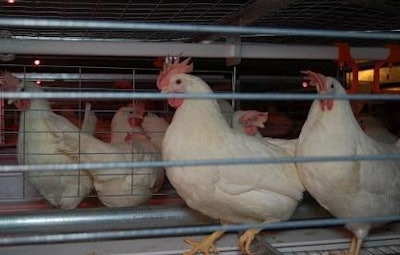
Representatives from the United Egg Producers, California egg farmers and the Humane Society of the United States met in mid-January to look at the language of the 2012 Egg Bill (H.R. 3798) and update it for 2013. The Egg Bill sets the parameters for a transition of the U.S. layer industry from conventional cage housing to enriched colony cages. Chad Gregory, president and CEO, United Egg Producers, said that an agreement was reached between the cooperative and the Humane Society of the United States on February 4, 2013, to slightly modify the 2012 Egg Bill. He said that work would begin immediately to craft the legislation based on this new agreement for introduction into both houses of Congress.
Agreement modifications
Gregory said that the requirement that ammonia levels in the layer house be kept at 25 parts per million or less was retained in the agreement, but the overall language of the Egg Bill will be changed so that "temporary excesses of ammonia will not constitute a violation of the act." He said that the language regarding ammonia will be modeled on the UEP Certified program.
In the 2012 version of the Egg Bill, the only exemption included was for farms with fewer than 3,000 layers. Researchers and primary breeders raised the need for more exemptions from the Egg Bill so that their important contributions to the industry would not be interfered with. In the 2013 version of the Egg Bill, Gregory said that exemptions will be added for primary breeders and research facilities.
Timing changes
The original agreement between the United Egg Producers and the Humane Society of the United States to seek passage of the Egg Bill was signed in July of 2011. The original expiration date for the agreement has come and gone, and the agreement has already been extended a couple of times. This new agreement between the United Egg Producers and the Humane Society of the United States will be in effect until September 30, 2013.
In the original agreement, the final conversion of conventional cages to enriched cages with the specified space per bird was to take place 18 years after the legislation was enacted. In the 2013 version of the Egg Bill, the final conversion date is set at January 1, 2030, regardless of when the legislation is passed.
Unfortunately, Gregory said the Humane Society of the United States would not consider revising any of the dates pertaining to implementation in California, where Proposition 2 has a January 1, 2015, compliance date. Gregory said that the United Egg Producers are committed to achieving passage of the Egg Bill in 2013.


















